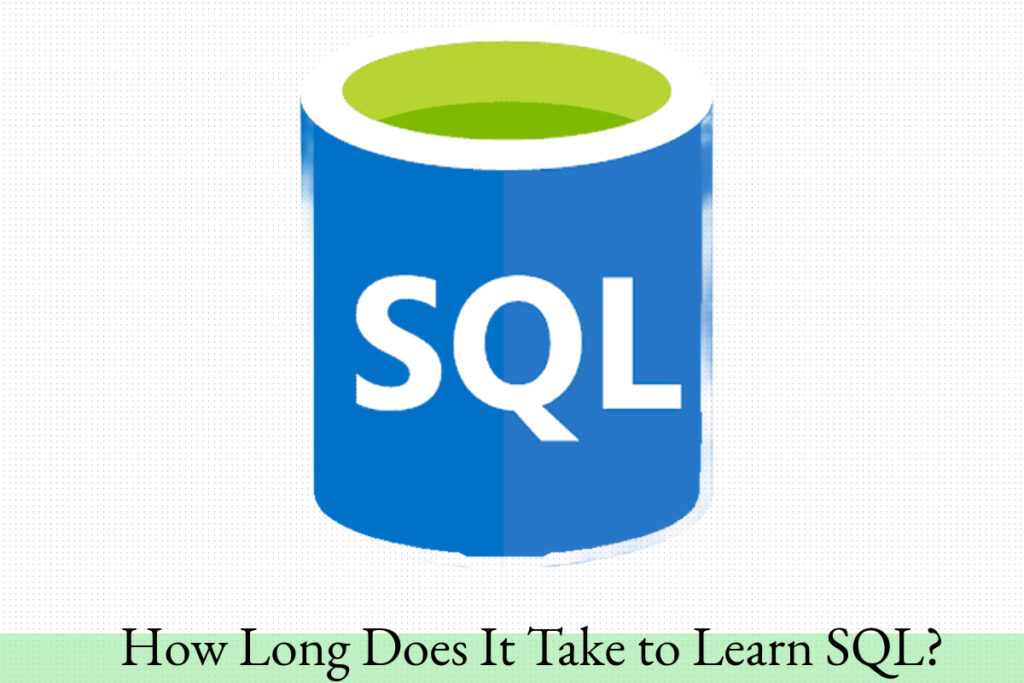What is SQL?
SQL stands for Standard Query Language and is a programming language that works with a traditional relational database. SQL helps to access, manage, and manipulate data in a relational database. The major functions of SQL are- Read, Write, Update, and Delete.
These functions provide the core functionality for database management, including creation, querying, updating, and deletion operations.
How Long Does It Take to Learn SQL?
That means you are about to start learning SQL or planning to do so, right?
Learning SQL (Structured Query Language) takes 30 hours to learn. Depending on the amount of time you have, and your prior experience really matters.
How Long Does It Take to Learn SQL for a Complete Beginner?
You are completely new to SQL or never learn any kind of programming language in your life like basic HTML/CSS and C+. People like those, I am considering a complete beginner and if the description matches you here you will get to know how long it will take for you to learn SQL.
So, for a complete beginner with no experience in prior coding experience, 6-12 weeks to learn SQL is needed. In the first two weeks, learn the basics of data and databases.
In the second phase (Week 2-5) learn the basic SQL commands and cover area like-
- SELECT, FROM, WHERE, ORDER BY
- Filtering and sorting
- Basic math and logic: AND, OR=, <, >
At the third phase try to learn other functions like: Multi-table JOINs, GROUP BY, subqueries, Common Table Expressions (CTEs). With 1 hour of practice each day you can achieve mid-level proficiency.
In the advanced stage you must learn topics like Window functions, stored procedures, indexes, performance tuning and it will take 2-3 months.
So, overall, it can be said that you can reach professional depth by investing 6 months even if you are a complete beginner.
About SaibbyWeb
Saibbyweb is a Srinagar, Kashmir-based digital-first creative studio. We provide custom software solutions, Design, Web Development, App Development, and Digital Marketing for mid-size businesses and startups.
Why Should You Learn SQL?
If you want to build your career in web development, cloud computing, data science, and machine learning- learning SQL is a must. If you are in tech and you need to explore more opportunities- you can learn data science as well. If you would like to do business and start in tech and AI, SQL may help you build databases and systems.
Where to Learn SQL for Free from Beginner to Advance?
If you would like to learn SQL for free, you can still learn it, but you might have to be more proactive and organized. But it’s totally possible to learn without spending a dime to learn SQL at an advanced level.
Below are some of the top places on internet to learn SQL from Basic to Pro for free:
W3Schools SQL Tutorial
Link: w3schools.com/SQL
- Easy to follow, hands-on practice built in.
- Great for: Total beginners.
Khan Academy – Intro to SQL
Link: khanacademy.org/computing/computer-programming/SQL
- Video-based learning + interactive coding
- Great for: Visual learners, absolute beginners
SQLBolt
Link: sqlbolt.com
- Interactive lessons + mini challenges
- Great for: Learning by doing
Mode Analytics SQL Tutorial
Link: mode.com/SQL-tutorial
- Uses real-world data (great for analysts)
- Great for: People interested in data analytics
LeetCode SQL Problems
Link: leetcode.com/problemset/database/
- Practice with real interview questions
- Great for: Intermediate learners & job prep
How to Learn SQL from Paid Courses?
If you are not an organized and proactive person- paid courses might be a great choice for you as they do all the work structuring the syllabus, content, and learning videos. This is the fastest way to learn and if you can get onto a reputable course, the certificate may also be helpful.
Here’s list of the best paid courses for SQL:
Uses of SQL
There are many use cases of SQL, but here are some of the most prominent uses of structured Query Language.
- Marketing Management, Analytics, and Measurements
- Secure store of financial records
- Healthcare management
- Mobile and Web Development
- Data and Business Analytics
- Data Science
Benefits of SQL (Structured Query Language)
- SQL Enables Efficient Data Querying.
- SQL Has Data Manipulation Capabilities.
- SQL Offer Structured Data Management.
- SQL Offer High Data Security.
- Easy Integration with Other Tools.
- Powerful Analytical Capabilities.
- SQL offers Robust Scalability and Performance.
- SQL is ACID Compliance.
- SQL has a large community of users for support.
Top Unusual Things to Do With SQL
SQL’s not just for SELECT * FROM boring- here are some unusual and clever ways people have pushed its limits:
- Approximate Missing Data
One developer used SQL to estimate missing warranty dates by comparing serial numbers and similar records- generating over $1M in revenue in six months.
- Build a Recipe Recommendation Engine
Use SQL to store ingredients, dietary tags, and user preferences, then query for optimal meal suggestions. Bonus: integrate with your lunch planning system.
- Carbon Emission Calculator
Track and analyze emissions data across activities using SQL logic to calculate footprints and suggest reductions.
- Sentiment Analysis with SQL
Store customer feedback and use SQL string functions and pattern matching to classify sentiment-primitive but surprisingly effective.
- SQL-Based Art Gallery System
Design a database to manage artworks, artists, and exhibitions. Add triggers to auto-update exhibit statuses or notify curators.
- Gamify Your Data
Create a leaderboard from employee performance metrics or project completion stats- SQL can rank, score, and even assign badges.
- Simulate Logic Puzzles
Use recursive CTEs to solve Sudoku, generate mazes, or simulate Conway’s Game of Life. Yes, in pure SQL.
- SQL as a Scripting Language
Some folks have built entire business logic layers in stored procedures—turning SQL into a pseudo-application engine.
